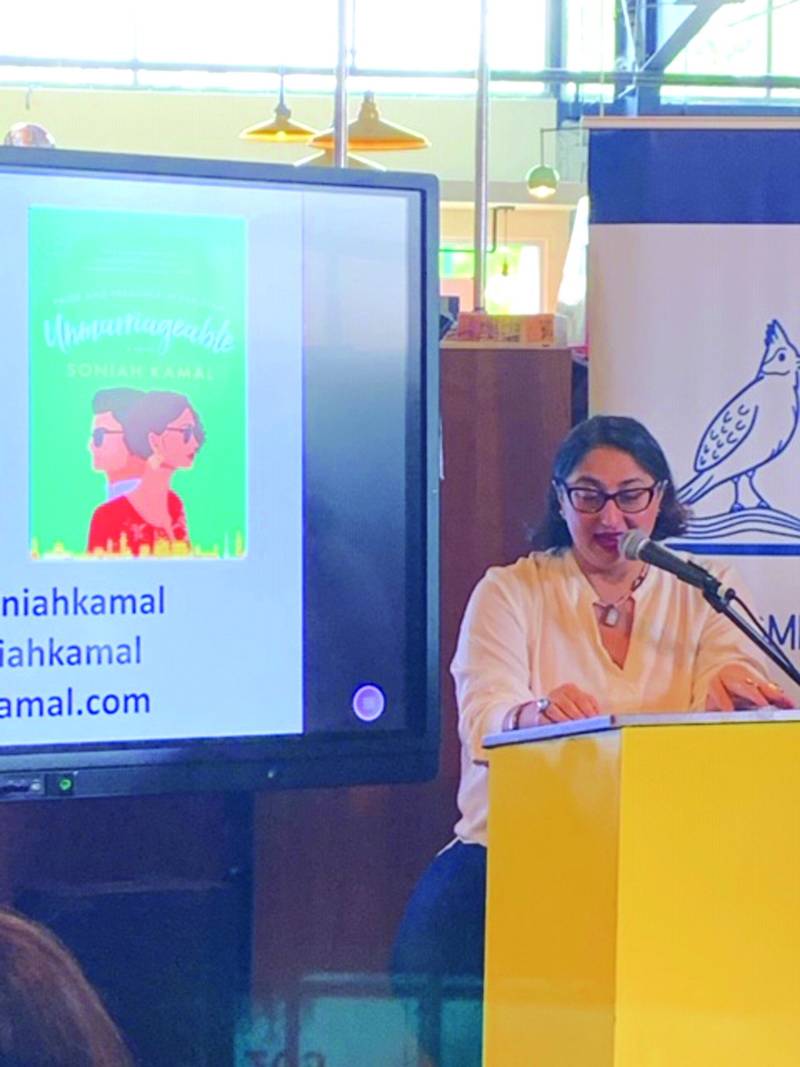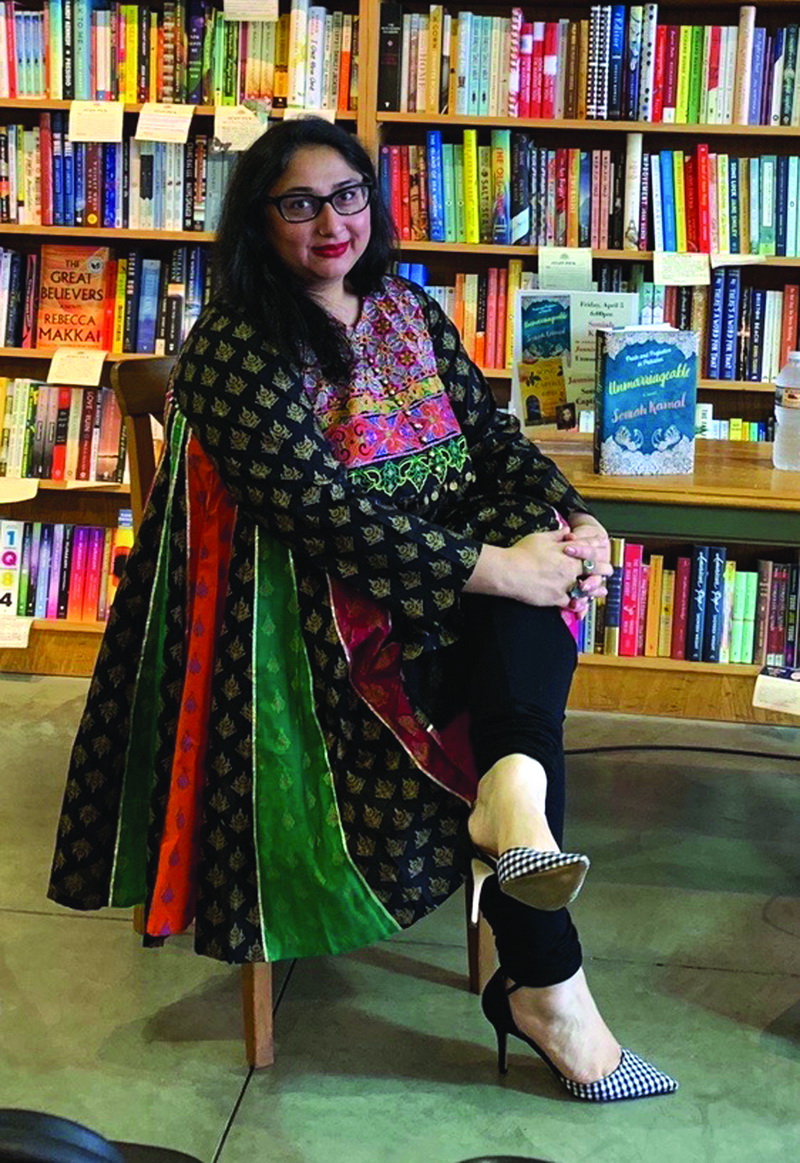
Soniah Kamal and I, we connect at a time when the Coronavirus is creating chaos and I’m staring at grey Seattle skies desperately and quite literally waiting for the clouds to part.
I decide to look for inspiration in women from my part of the world, based here in the US - far from their roots yet doing us proud.
And so it made perfect sense to track down Ms Kamal. Her accolades are impressive.
Soniah is an award-winning novelist, essayist and public speaker. Her first book An Isolated Incident was published in 2014. Her recent, second novel, Unmarriageable is a Financial Times Readers’ Best Book of 2019, a 2019 Book all Georgians Should Read and shortlisted for the 2020 Townsend prize for Fiction.
Soniah – based in Atlanta, Georgia – is feisty yet sensitive, vibrant yet pensive. She explains her views with firm clarity but there are pauses when her eyes well up and you sense her depth of feeling.
Her work has created a stir in the US and other parts of the world. I find Unmarriageable displayed in Seattle’s bookstores, under ‘best reads’. Pakistan has arrived in the Pacific North-West and beyond.

***
We start our talk by my wanting to know if Soniah had been expecting this kind of success – a Pakistani book doing so well in the U.S?
Soniah Kamal (SK): No I wasn’t. Usually what tends to work or what publishers have so far been looking at are books by people of colour which are either about the immigrant experience, usually told through generational clashes, or the “woe, woman is me” trope, “I’ve come from a different country, I’m in the U.S and now I’ve found myself.” Or it’s the terrorism angle. Unmarriageable is neither of these.
My first book An Isolated Incident was about all of this.
Twenty years ago when I tried to publish, I was told that no one wanted to read about a book set in Pakistan. With my current book, I was expecting a struggle but it literally sold to Penguin Random House within weeks. It’s been a great experience.
With Unmarriageable, I was wondering if the editor would ask me to spice up some stuff but not a single thing and that was wonderful.
Hopefully times have changed. To have an uplifting novel totally set in Pakistan without a white character in sight has been an amazing adventure.
In Unmarriageable, the Binat girls do not want to come to the US. They like Pakistan and want to live in Pakistan. They don’t want to move here and be overworked.
Zeinab Masud (ZM): (deep sigh) SO true for many of us. (smile)
It also seems that while set in the heart of Pakistan, the book inspires a global connection...
SK: I’m so delighted and amazed when people from across cultures reach out.
People from a Jewish culture, Russian background, Greek, Nigerian, Chinese...and more. They say, “This is just like us.” I say, “Glad to know that you are Pakistani also!”
I had a very early background in terms of being able to click with the universalities rather than differences. The stories I read as a child became about me.
I feel that with Unmarriageable, when readers from different backgrounds say that this is just like us. That is wonderful for me.
When you read about terrorism, you already reading a tale about ‘the other’. But for me, the best thing about Unmarriageable is the universality of it. In the deep South, women who have grown up in Scarlett O’Hara country say that this is about them!
ZM: You found a universal thread and you set it in Pakistan. Has this been done before?
SK: It hasn’t. One writes what one wants to write, with no propaganda in mind. I wrote a story set in Pakistan to take back colonialism in some way. I’m an Austen fan but I would have loved to have grown up having my own Austen. Toni Morrison says that if there’s a book out there you want to read, write it! That’s exactly what I did.
Nalini Iyer, a Seattle professor said, Unmarriageable is “Macaulay’s nightmare.”
As post-subjects of the Empire, we are expected to look up to everything Empire. This was my attempt to take the language I’ve grown up in and the culture I’ve grown up in and meld them together. It’s also an attempt to take back linguistic policy.
As far as Unmarriageable is concerned, the fact is that the responses have been so gratifying. It’s a been a joyride.
ZM: What about female influencers? What role have they played in your art? In your success?
SK: For me, it’s not necessarily been one person, it’s been through art and pop-culture, through books and authors. I feel Thomas Hardy had great impact on me and in Austen’s work, Mansfield Park. In terms of literary influencers, I can’t say there’s one, but Leslie Marmon Silko’s short story Lullaby is absolute linguistic imperialism, taking a story out of one language and putting it in another language and what that means about who and what they are going to turn into.
Also in terms of influences, my mother being an anesthesiologist was a big deal for me. I was very impressed by her. I remember when I was very young, someone eve-teased her and she slapped him and screamed at him. The fact that she wasn’t scared of making a hullabaloo in public in the 1980s was a big deal for me.
ZM: In these times of Aurat March and significant voices for Women’s Day, how far have we come from Austen’s times? Glass ceilings shattered?
SK: Oh, we have come very, very far. I was at the Aurat March last year. It was fantastic. It wasn’t just Aurat, it was a lot of guys as well, marching for mothers, sisters, daughters.
Women now have the choice to marry who they want or remain single, or work. You couldn’t do that in Regency England.
Things have changed completely. We have women in the sports field, pilots, doctors, engineers and more. What don’t we have?
In our rural Pakistan, women have always been working. They work very hard, as do the domestic staff. These women earn a salary and they are working women as well. Those women have also influenced me.
They got on the wagons and the buses long before any of us in our chauffeur-driven cars had to. I have great respect for these women. THEY are the strong women.
If you notice, in Unmarriageable, none of the men are working. The women are supporting them.
ZM: There’s great wit in the book and you are a vibrant narrator. Were you always this way? How has your journey shaped you?
SK: When I was in my teenage years, my cousin’s husband’s nickname for me was Bubbly. And this bubbliness was really wrenched out of me during my five years in Pakistan. This was from ninth grade till my A’levels. I was different and outspoken. Back in the 1980s, I supported LGBTQ rights. I arrived in Pakistan as a teenager looking like Madonna. Those years were rough on me. I saw a lot of hypocrisy.There seemed no space for a person like me, who did not want to lead a double life. I wanted to do things openly. If I smoked, I wanted to do so openly as the guys did.
I was someone with a nickname like Bubbly who had to resort to cutting herself to survive.
I refused to adhere, I stayed the person I was. This was not a culture that appreciated this – especially not in the 1980s and early '90s. There’s room for girls like that now, but not at that time.
Our culture is so wrapped up in morality and what a good woman should be like.
I weirdly enough didn’t fit the norm, yet turned out to be “a good woman.”
I’m married with three kids, a home and a career. Yet I wear three nose rings and swear. I don’t fit any boxes.
I was book smart also. I wasn’t just bubbly. My favourite character has always been Mr. Knightly because he’s kind to Harriet Smith. Kindness is most important for me. If there’s any message that comes from my book, it is this. It doesn’t take much and you never know whose life you may be changing by an act of kindness.
In Pakistan, a respectable woman is seen as a mother, wife, daughter or sister.
We need to start instinctively realizing that single women, divorced women, women who don’t fit any of the earlier mentioned moulds - are just as worthy of respect. You don’t have to be their best friend but you can’t throw stones at them. They deserve to be left alone. Let us live.
Growing up, I was non-conformist and felt that I was constantly judged. I chewed gum and had an opinion and that was threatening to you? That was not good. It’s been an interesting journey.
ZM: What would you want to say to women from our part of the world out here in the US? Or women in Pakistan?
SK: I would want women to be where they are happy with themselves. I would also say that not judging each other is important. Pakistan is going through an interesting transition. No bigger marker of changing gender roles other than the fact that the Aurat March went through.

